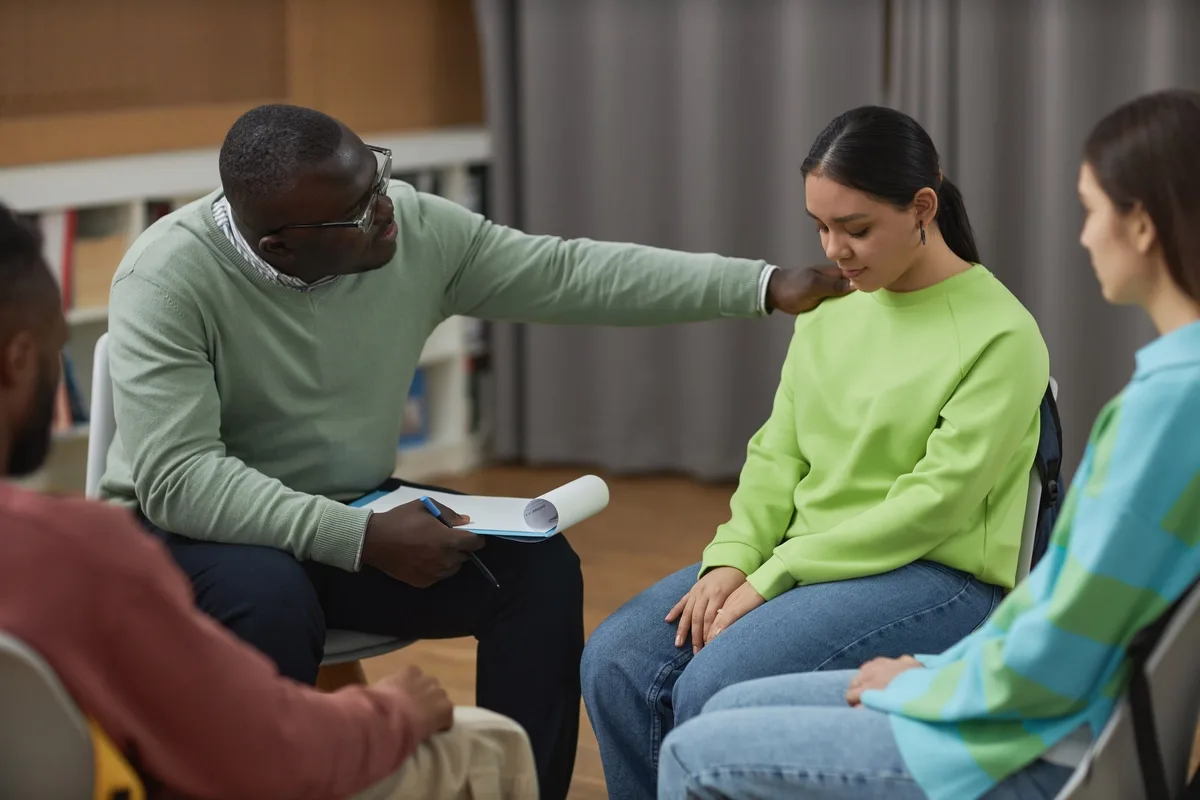24/7 Helpline:
(866) 899-221924/7 Helpline:
(866) 899-2219
Learn more about Bipolar Disorder Treatment centers in Los Angeles
Bipolar Disorder Treatment in Other Cities

Other Insurance Options

Regence

Providence

Optum

UMR

Oxford

CareFirst

American Behavioral

BHS | Behavioral Health Systems
Beacon

MHNNet Behavioral Health

Holman Group

Medical Mutual of Ohio

Access to Recovery (ATR) Voucher

CareSource

Amerigroup

Multiplan

Ambetter

Sliding scale payment assistance

Anthem

PHCS Network

Hollywood Hills Recovery
Hollywood Hills Recovery is a private rehab located in Los Angeles, California. Hollywood Hills Reco...

Kaiser Permanente – Addictions
Kaiser Permanente – Addictions is a private rehab located in Los Angeles, California. Kaiser Permane...

HOPICS – South Broadway
HOPICS — which stands for Homeless Outreach Program Integrated Care System — is a community organiza...

Luxe Recovery
Located in Los Angeles, California, Luxe Recovery is a drug and alcohol rehab that supports adults s...

Tarzana Treatment Center
Tarzana Treatment Center - Reseda Boulevard is a full-service behavioral healthcare organization tha...

Sober College
Sober College provides substance abuse and mental health treatment for young adult men and women age...

Monte Nido – Eating Disorder Center of California
Monte Nido – Eating Disorder Center of California is a private rehab located in Los Angeles, Califor...

Alcohol and Drug Abuse – Latino Recovery Home
Alcohol and Drug Abuse - Latino Recovery Home offers inpatient treatment for individuals with alcoho...

Growth Extended
Growth Extended offers intensive outpatient and residential treatment for adolescents who struggle w...

New Vistas Sober Living
New Vistas Sober Living is a private rehab located in Los Angeles, California. New Vistas Sober Livi...

Clearview Treatment Programs – Grandview Avenue
Clearview Treatment Programs – Grandview Avenue is a private rehab located in Los Angeles, Californi...

Bimini Recovery Center – Mary Lind Recovery Centers
Bimini Recovery Center – Mary Lind Recovery Centers is a private rehab located in Los Angeles, Calif...

Fred Brown Recovery Services – 276 West 14th Street
Fred Brown Recovery Services – 276 West 14th Street is a private rehab located in Los Angeles, Calif...

Authentic Recovery Center – Residential
Authentic Recovery Center - ARC provides inpatient and outpatient services for individuals with alco...

Narcotics Prevention Project – Methadone Treatment
Narcotics Prevention Project – Methadone Treatment is a private rehab located in Los Angeles, Califo...

Airport Marina Counseling Services
Airport Marina Counseling Services is a private rehab located in Los Angeles, California. Airport Ma...

Homeless Healthcare of Los Angeles
Homeless Healthcare of Los Angeles is a private rehab located in Los Angeles, California. Homeless H...

Youth and Family Services – Boyle Heights
Youth and Family Services – Boyle Heights is a private rehab located in Los Angeles, California. You...

First to Serve Outreach Ministries
First to Serve Outreach Ministries is a private rehab located in Los Angeles, California. First to S...

The High Road Program
The High Road Program provides education and substance abuse counseling for individuals referred thr...

California Health Alcohol
California Health Alcohol is a private rehab located in Los Angeles, California. California Health A...

Clinica Monsenor Oscar A Romero
Clinica Monsenor Oscar A Romero is a private rehab located in Los Angeles, California. Clinica Monse...

Hollywood Mental Health Center
Hollywood Mental Health Center is a public rehab located in Los Angeles, California. Hollywood Menta...

Sunrise Community Counseling Center
Sunrise Community Counseling Center is a private rehab located in Los Angeles, California. Sunrise C...

His Sheltering Arms Outpatient
His Sheltering Arms Outpatient is a private rehab located in Los Angeles, CA. His Sheltering Arms Ou...

Didi Hirsch Mental Health Center – West Manchester Avenue
Didi Hirsch Mental Health Center – West Manchester Avenue is a private rehab located in Los Angeles,...

Children’s Bureau – Oakwood Family Center
Children’s Bureau – Oakwood Family Center is a private rehab located in Los Angeles, California. Chi...

Hazelden Betty Ford Foundation
Hazelden Betty Ford Foundation - Santa Monica Boulevard offers an outpatient treatment program that ...

BHS – Boyle Heights Family Recovery Center
Boyle Heights Family Recovery Center (BHS) is a 12 step focused outpatient drug and alcohol rehab in...

Paloma Recovery Home
Paloma Recovery Home is a private rehab located in Los Angeles, CA. Paloma Recovery Home specializes...

Social Model Recovery Systems – Royal Palms
Located in Los Angeles, California, Social Model Recovery Systems – Royal Palms is a drug and alcoho...

Pacific Asian Alcohol and Drug Program
Special Services for Groups - Pacific Asian Alcohol and Drug Program is a non profit rehab located i...

Cri Help – The George T. Pfleger Center
Cri Help - The George T. Pfleger Center offers gender-specific residential treatment for those indiv...

Pacific Asian Counseling Services
Pacific Asian Counseling Services is a private rehab located in Los Angeles, California. Pacific Asi...

Fred Brown Recovery Services
Fred Brown Recovery Services is a non-profit rehab located in Los Angeles, California. Fred Brown Re...

Recovery Now
Recovery Now is a private rehab located in Los Angeles, California. Recovery Now specializes in the ...

Fred Brown Recovery Services – Women’s House
Fred Brown Recovery Services – Women’s House is a drug and alcohol rehab that supports women aged 18...

Gateways Hospital and Mental Health Center
Gateways Hospital and Mental Health Center is a private rehab located in Los Angeles, California. Ga...

Phoenix House – Services for Teens in Los Angeles
Phoenix House - Eldridge Avenue offers inpatient and outpatient treatment for individuals with alcoh...

Center for Individual and Family Counseling – Valley Village
Center for Individual and Family Counseling – Valley Village is a private rehab located in Los Angel...

Amity Foundation – Amistad de Los Angeles
Amity Foundation – Amistad de Los Angeles is a private rehab located in Los Angeles, California. Ami...

East Los Angeles Health Task Force – Substance Abuse
East Los Angeles Health Task Force – Substance Abuse is a private rehab located in Los Angeles, Cali...

La Fuente Hollywood Treatment Center
La Fuente Hollywood Treatment Center offers inpatient and outpatient treatment specifically designed...

Child and Family Guidance Center – Balboa Boulevard
Child and Family Guidance Center – Balboa Boulevard is a private rehab located in Los Angeles, Calif...

Covenant House California
Covenant House California is an inpatient rehab located in Los Angeles, CA. Covenant House Californi...

The Advanced Drug Rehab Center
The Advanced Drug Rehab Center offers outpatient treatment for individuals with alcohol and/or subst...

USC Medical Center – Behavioral Health
USC Medical Center – Behavioral Health is a public rehab located in Los Angeles, California. USC Med...

Fred Brown Recovery Services – 278 West 14th Street
Fred Brown Recovery Services – 278 West 14th Street is a non-profit rehab located in Los Angeles, Ca...

Mini Twelve Step House
Mini Twelve Step House offers residential treatment for women and women with small children struggli...

Bridge at Valley Glen
Bridge at Valley Glen is a private rehab for men located in Van Nuys, CA. Bridge at Valley Glen offe...

Los Angeles LGBT Mental Health
Los Angeles LGBT Mental Health is a private rehab located in Los Angeles, California. Los Angeles LG...

BAART Programs – Southeast
BAART Programs - Southeast is an outpatient clinic who provides methadone treatment and substance us...

AADAP – Asian American Drug Abuse Program – Therapeutic Community
Asian American Drug Abuse Program (AADAP) - Therapeutic Community offers adult inpatient treatment a...

Watts Health – House of Uhuru
Watts Health – House of Uhuru is a private rehab located in Los Angeles, California. Watts Health – ...

Children’s Bureau – Magnolia Place Family Center
Children’s Bureau – Magnolia Place Family Center is a private rehab located in Los Angeles, Californ...

LACADA – Los Angeles Center for Alcohol and Drug Abuse
Los Angeles Center for Alcohol and Drug Abuse (LA CADA) is an alcohol and drug rehabilitation center...

Cri Help – Outpatient
Cri Help - Outpatient offers treatment for individuals with alcohol and/or substance addiction. The ...

Dallas Taylor Interventions
Dallas Taylor Interventions is a private rehab located in Los Angeles, California. Dallas Taylor Int...

Felicity House Women’s
Felicity House Women’s is a non-profit rehab located in Los Angeles, California. Felicity House Wome...

Valley Community Healthcare
Valley Community Healthcare is a private rehab located in Los Angeles, California. Valley Community ...

Gateways Hospital and Mental Health Center – Adult Residential
Gateways Hospital and Mental Health Center – Adult Residential is a private rehab located in Los Ang...

Nerine Shatner Friendly House
Nerine Shatner Friendly House is a sober living facility that offers treatment services for women wh...

Beit T’Shuvah
Beit T’Shuvah, located in Los Angeles, California, offers addiction treatment services for individua...

Chabad Residential Treatment Center
Chabad Residential Treatment Center offers a residential treatment program for those men ages 18 and...

Turning Point – Alcohol and Drug Education Program
Turning Point – Alcohol and Drug Education Program is a private rehab located in Los Angeles, Califo...

Latinas Alcohol Recovery Home
Latinas Alcohol Recovery Home offers residential treatment for women struggling with alcohol and oth...

Phoenix House – Venice Beach Residential and Outpatient Services
Phoenix House - Ocean Front Walk offers inpatient and outpatient treatment for individuals with alco...

Dare U to Care
Dare U to Care - Outreach Ministry is a non-profit rehab located in Los Angeles, CA. Dare U to Care ...

McIntyre House
McIntyre House is a non-profit rehab located in Los Angeles, CA. McIntyre House offers a unique, cha...

Alcott Center for Mental Health Services
Alcott Center for Mental Health Services is a private rehab located in Los Angeles, California. Alco...

Vista Del Mar Outpatient Center
Vista Del Mar Outpatient Center is a private rehab located in Los Angeles, California. Vista Del Mar...

Avalon Carver Community Center
Avalon Carver Community Center is a private rehab located in Los Angeles, California. Avalon Carver ...

Tarzana Treatment Centers – 6022 Variel Avenue
Tarzana Treatment Centers – 6022 Variel Avenue is a private rehab located in Los Angeles, California...

Augustus Hawkins Family Mental Health Center
Augustus Hawkins Family Mental Health Center is a public rehab located in Los Angeles, California. A...

Van Ness Recovery House
Van Ness Recovery House is a private rehab located in Los Angeles, California. Van Ness Recovery Hou...

Mela Counseling
Mela Counseling is a non-profit rehab located in Los Angeles, California. Mela Counseling specialize...

Jewish Family Service – Pico Robertson Family Resource Center
Jewish Family Service - Pico-Robertson Family Resource Center provides culturally sensitive services...

Childrens Hospital – Mental Health
Childrens Hospital – Mental Health is a private rehab located in Los Angeles, California. Childrens ...

Vinewood Community Correction
Vinewood Community Correction is a private rehab located in Los Angeles, California. Vinewood Commun...

Didi Hirsch Mental Health Services – Jump Street
Didi Hirsch Mental Health Services – Jump Street is a private rehab located in Los Angeles, Californ...

New Hope Drug and Alcohol Treatment Program
New Hope Drug and Alcohol Treatment Program offers a variety of outpatient programs for individuals ...

Kaiser Permanente – Chemical Dependency
Kaiser Permanente – Chemical Dependency is a private rehab located in Los Angeles, California. Kaise...

Special Services for Groups – Weber Community Center
Special Services for Groups – Weber Community Center is a private rehab located in Los Angeles, Cali...

California Hospital Medical Center – Behavioral Health
California Hospital Medical Center – Behavioral Health is a private rehab located in Los Angeles, Ca...

El Centro de Ayuda
El Centro de Ayuda provides behavioral health services and court ordered classes to low-income youth...

Casa Vista Sober Living
Casa Vista Sober Living provides substance abuse treatment for men who desire to recover form addict...

Edelman Westside Mental Health Center
Edelman Westside Mental Health Center is a public rehab located in Los Angeles, California. Edelman ...

Coastal Recovery Comprehensive Treatment Center
Coastal Recovery Comprehensive Treatment Center is a private rehab located in Los Angeles, Californi...

Safety Education Center
Safety Education Center is a private counseling clinic located in Reseda, California. Safety Educati...

The Canyon at Santa Monica
The Canyon at Santa Monica offers outpatient treatment by engaging the whole person in the healing p...

Haven House Treatment – 2260 Hillsboro Avenue
Haven House Treatment - 2260 Hillsboro Avenue provides sober living services for men with alcohol an...

United American Indian Involvement
United American Indian Involvement is a private rehab located in Los Angeles, California. United Ame...

BAART Programs – Beverly
BAART Programs - Beverly offers medication assisted treatment in combination with counseling for opi...

Muse Treatment
Muse Treatment is a comprehensive alcohol and substance abuse treatment and/or co-occurring disorder...

BAART Programs – Boyle Heights
BAART Programs - Boyle Heights is an outpatient clinic who provides methadone treatment and substanc...

Adolescent Growth
Adolescent Growth provides outpatient and inpatient services for teens with mental health challenges...

Muse Treatment – Westwood Boulevard
The Muse Treatment Westwood Boulevard facility stands as a CARF-accredited addiction rehab center in...

Evolve Treatment Centers for Teens – Vanalden
Evolve Treatment Centers for Teens - Vanalden is located in Tarzana, California. Evolve Treatment Ce...
The Beacon House Association of San Pedro – 1021 Beacon Street
The Beacon House Association of San Pedro is a residential treatment facility for adult men struggli...

Evolve – Bel Air Treatment
Evolve - Bel Air Treatment offers individualized mental health and substance abuse treatment for tee...

Destinations
Destinations - Wilshire Boulevard offers intensive outpatient programs for adolescents with alcohol ...
The Beacon House Association of San Pedro
The Beacon House Association of San Pedro is a residential treatment facility for adult men struggli...

Hollywood Medical & Mental Health Services
Hollywood Medical & Mental Health Services is a private rehab located in Los Angeles, CA. Hollywood ...

Venice Medical & Mental Health Services
Venice Medical & Mental Health Services is a private rehab located in Venice, CA. Venice Medical & M...

Van Nuys Medical & Mental Health Services
Van Nuys Medical & Mental Health Services is a private rehab located in Van Nuys, CA. Van Nuys Medic...

Key Transitions
Key Transitions is dedicated to help adolescents and young adults who may be dealing with mental hea...

BHS – High Gain Drinking Driver Program
BHS - High Gain Drinking Driver Program is for people convicted of a first, second or third offense....

Sanctuary Treatment Center
Sanctuary Treatment Center is a rehabilitation facility that offers treatment for chemical dependenc...

REVIVE Detox
REVIVE Detox is an addiction recovery provider offering private medical detox, intervention, varied ...

Passages Beverlywood
Passages Beverlywood offers treatment for individuals with alcohol and/or substance addiction. The p...

Evolve Treatment Centers for Teens – Aura
Evolve Treatment Centers for Teens is located in Tarzana, California. Evolve Treatment Centers for T...

Westside Treatment
Westside Treatment provides treatment for addiction and mental health challenges in their several ou...

Keystone Treatment
Keystone Treatment Center is a traditional rehab located in Los Angeles, CA. Keystone Treatment Cent...

The Villa Treatment Center
The Villa Treatment Center is a private rehab located in Woodland Hills, CA. The Villa Treatment Cen...

Alta Centers Detox
Alta Centers Detox offers inpatient services for individuals with alcohol and/or substance addiction...

The Muse House
The Muse House has a beautiful inpatient residence where patients have a safe and healthy place to o...

Concise Recovery Center
Concise Recovery Center is a private rehab center located in Sherman Oaks, Ca. Concise Recovery Cent...

Conclusions Treatment Center
Conclusions Treatment Center is a private rehab located in Mission Hills, CA. Conclusions Treatment ...

Forward Recovery
Forward Recovery is a private rehab located in Los Angeles, California. Forward Recovery specializes...

Launch Centers
Launch Centers is a private rehab located in Los Angeles, California. Launch Centers specializes in ...

Carus Recovery
Carus Recovery is a private rehab located in Los Angeles, California. Carus Recovery specializes in ...

Restore
Restore is a private rehab center located in Canoga Park, California. Restore specializes in the tre...

Iris Healing – Residential
Iris Healing is a true dual-diagnosis detox/residential treatment facility that provides our patient...

Nexus Recovery Services
Nexus Recovery Services offers a unique experience for individuals who truly want a change. They off...

Awakening Recovery
Awakening Recovery is a non-profit rehab located in Los Angeles, California. Awakening Recovery spec...

Grace Recovery
Grace Recovery is a private rehab located in Los Angeles, California. Grace Recovery specializes in ...

All American Detox
All American Detox is a private rehab located in Los Angeles, California. All American Detox special...

Authentic Recovery Center – Outpatient
Authentic Recovery Center - Outpatient is a private rehab located in Los Angeles, California. Authen...

Starbridge Recovery Center
Starbridge Recovery Center is a private rehab located in Los Angeles, California. Starbridge Recover...

The Teen Project
The Freehab treatment program is funded by Los Angeles Public Health – Substance Abuse Prevention an...

Recover Integrity
Recover Integrity is a private rehab located in Los Angeles, California. Recover Integrity specializ...

Westwind Recovery
Westwind Recovery, situated in Los Angeles, California, is dedicated to offering a comprehensive sui...

Novo Detox
Our Method The NOVO Detox Method optimizes a comprehensive treatment plan for long-term sobriety and...

Inneractions
Inneractions is a private rehab located in Los Angeles, California. Inneractions specializes in the ...

Saving My Tomorrow
Saving My Tomorrow is a public rehab located in Los Angeles, California. Saving My Tomorrow speciali...

Optimum Performance Institute – OPI
Optimum Performance Institute – OPI is a private rehab located in Los Angeles, California. Optimum P...

Conquer Recovery Centers
Conquer Recovery Centers is a private rehab located in Los Angeles, California. Conquer Recovery Cen...

Divinity Recovery
Divinity Recovery is a private rehab located in Los Angeles, California. Divinity Recovery specializ...

Journey Hillside Tarzana
Journey Hillside Tarzana is a private rehab located in Los Angeles, California. Journey Hillside Tar...

Golden Road Recovery
At Golden Road Recovery we see addiction as a symptom of a larger illness, almost as an attempt to s...

Volunteers of America of Los Angeles – Outpatient Treatment
Volunteers of America of Los Angeles – Outpatient Treatment is a private rehab located in Los Angele...

Outpatient Los Angeles
At Outpatient Los Angeles, we employ an evidence-based treatment philosophy that uncovers the root c...

Safety Consultant Services
Safety Consultant Services offers outpatient treatment for individuals with alcohol and/or substance...

Holy Addiction Care Canter
Holy Addiction Care Canter is a private rehab located in Los Angeles, California. Holy Addiction Car...
The Beacon House Association of San Pedro – 1003 Beacon Street
The Beacon House Association of San Pedro is a residential treatment facility for adult men struggli...

Recovery Corps Health Group
Recovery Corps Health Group is a private rehab located in Los Angeles, California. Recovery Corps He...

Social Model Recovery System – Mariposa
Social Model Recovery System - Mariposa offers inpatient treatment for women with alcohol and/or sub...

Support for Harbor Area Women’s Lives – Shawl House
Support for Harbor Area Women’s Lives – Shawl House is a non-profit rehab located in Los Angeles, Ca...

Resolve Recovery
Resolve Recovery offers inpatient treatment for women with alcohol and/or substance addiction. The p...

BHS – Hollywood Recovery Center
Behavioral Health Services (BHS), located in Hollywood, California, is a nonprofit, community based,...

Ness Counseling Center
Ness Counseling Center is a private rehab located in Los Angeles, California. Ness Counseling Center...

Shields for Families – Genesis Family Day Treatment Program
Shields for Families – Genesis Family Day Treatment Program is a private rehab located in Los Angele...

Harmony Place
Harmony Place offers rehabilitation services for individuals with substance abuse and co-occurring d...

Hathaway Sycamores Child And Family Services
Hathaway Sycamores Child And Family Services is a private rehab located in Los Angeles, California. ...

AADAP – Asian American Drug Abuse Program
Asian American Drug Abuse Program offers outpatient services for individuals with alcohol and/or sub...

































The Center for Healthy Sex
The Center for Healthy Sex is a private rehab located in Los Angeles, California. The Center for Hea...

Sober Companions
Sober Companions is a private rehab located in Los Angeles, California. Sober Companions specializes...

The Bella Vita
The Bella Vita offers day treatment, intensive outpatient and outpatient services for adolescents an...

AA – Alcoholics Anonymous – Al fin Libres
AA – Alcoholics Anonymous – Al fin Libres is a non-profit rehab located in Los Angeles, California. ...

Manifest Recovery Centers
Manifest Recovery Centers is a private rehab located in Los Angeles, California. Manifest Recovery C...

BLVD Treatment Centers
BLVD Treatment Centers with its Highland Avenue location near Hollywood and Beverly Hills, offers ou...

Peace by Piece Residential Treatment Center
Peace by Piece Residential Treatment Center is a private rehab located in Los Angeles, California. P...

AltaMed Health Services
AltaMed Health Services is a private rehab located in Los Angeles, California. AltaMed Health Servic...

Community Family Counseling Programs
Community Family Counseling Programs is a private rehab located in Los Angeles, California. Communit...

East LA Family Recovery Center
East LA Family Recovery Center is a private rehab located in Los Angeles, California. East LA Family...

Westside Alano Club
Westside Alano Club is a non-profit rehab located in West Los Angeles, California. Westside Alano Cl...

Synergy Sober House
Synergy Sober House is a private rehab located in Los Angeles, California. Synergy Sober House speci...

Atlantic Recovery Services
Atlantic Recovery Services is a private rehab located in Los Angeles, CA. Atlantic Recovery Services...

You Can Health Services – Alcohol and Drug Counseling
You Can Health Services – Alcohol and Drug Counseling is a private rehab located in Los Angeles, Cal...

Diversion Intervention Foundation
Diversion Intervention Foundation is a non-profit rehab located in Los Angeles, California. Diversio...

Pacific Treatment Centers
Pacific Treatment Centers is a private rehab located in Los Angeles, California. Pacific Treatment C...

El Centro Del Pueblo – ECDP
El Centro Del Pueblo provide mental health services for children, youth and families around the comm...

Bienestar – Substance Abuse Specialists
Bienestar – Substance Abuse Specialists is a private rehab located in Los Angeles, California. Biene...

Stages of Change Counseling Center
Stages of Change Counseling Center is a private rehab located in Los Angeles, California. Stages of ...

Spencer Recovery
Spencer Recovery is a private rehab located in Los Angeles, California. Spencer Recovery specializes...

Latino Family Alcohol and Drug Center
Latino Family Alcohol and Drug Center is a private rehab located in Los Angeles, California. Latino ...

Alternatives Addiction Treatment
Alternatives Addiction Treatment is a private rehab located in Los Angeles, California. Alternatives...

Circle of Friends Outpatient
Circle of Friends Outpatient is a private rehab located in Los Angeles, California. Circle of Friend...

Iran Recovery Center
Iran Recovery Center is a private rehab located in Los Angeles, California. Iran Recovery Center spe...

Volunteers of America
Volunteers of America is a non-profit rehab located in Los Angeles, California. Volunteers of Americ...

NAPAFASA – National Asian Pacific American Families Against Substance Abuse
National Asian Pacific American Families Against Substance Abuse (NAPAFASA) is a non-profit rehab lo...

Atlantic Recovery Services Charter B
Atlantic Recovery Services Charter B is a private rehab located in Los Angeles, California. Atlantic...

Shields for Families
Shields for Families is a non-profit rehab located in Los Angeles, California. Shields for Families ...

McLaughlin Sober Living House
McLaughlin Sober Living House is a private rehab located in Los Angeles, California. McLaughlin Sobe...

Walden House Transitional Treatment Center
Walden House, a part of HealthRIGHT 360, is a dual diagnosis addiction treatment rehab that provides...

Diversion – The First Stop
Diversion – The First Stop is a private rehab located in Los Angeles, California. Diversion – The Fi...

Didi Hirsch Mental Health Services – Metro Center
Didi Hirsch Mental Health Services – Metro Center is a public rehab located in Los Angeles, Californ...

Asian Pacific Counseling and Treatment Center
Asian Pacific Counseling and Treatment Center is a private rehab located in Los Angeles, California....

Volunteers of America – San Pedro
Volunteers of America – San Pedro is a non-profit rehab located in Los Angeles, California. Voluntee...

People Coordinated Services Of Southern California
People Coordinated Services Of Southern California is a private rehab located in Los Angeles, Califo...

AA – Grupo Que Paso
Alcoholics Anonymous is an international fellowship of men and women who have had a drinking problem...

Project: NewHab
Project: NewHab is a private rehab located in Los Angeles, California. Project: NewHab specializes i...

Pacifica Hospital of the Valley – Behavioral Health
Pacifica Hospital of the Valley – Behavioral Health is a private rehab located in Los Angeles, Calif...

Narcotic Addiction Treatment Agency – NATA
Narcotic Addiction Treatment is a private rehab located in Sun Valley, CA. Narcotic Addiction Treatm...

AA – Alcoholicos Anonimos
AA – Alcoholicos Anonimos is a non-profit rehab located in Los Angeles, California. AA – Alcoholicos...

Christian Drug Rehab
Christian Drug Rehab is a private rehab located in Los Angeles, California. Christian Drug Rehab spe...

National Council on Alcohol and Drug Dependency
National Council on Alcohol and Drug Dependency is a private rehab located in Los Angeles, Californi...

Castle Substance Abuse Program – Residential
Castle Substance Abuse Program – Residential is a private rehab located in Los Angeles, California. ...

American Drug Treatment Center
American Drug Treatment Center is a private rehab located in Los Angeles, California. American Drug ...

Wilshire Treatment Center
Wilshire Treatment Center is a private rehab located in Los Angeles, California. Wilshire Treatment ...

Gateways Hospital Child and Adolescent Outpatient
Gateways Hospital Child and Adolescent Outpatient is a private rehab located in Los Angeles, Califor...

Promises Treatment Centers – South Barrington Avenue
Promises Treatment Centers - 3743 South Barrington Avenue young adult rehab program is located in th...

AA – Alcoholics Anonymous – Grupo Siempre Unidos
AA – Alcoholics Anonymous – Grupo Siempre Unidos is a non-profit rehab located in Los Angeles, Calif...

Extended Care Drug and Alcohol Treatment
Extended Care Drug and Alcohol Treatment offers outpatient and inpatient treatment for individuals w...

AA – Alcoholics Anonymous – Western Area
AA – Alcoholics Anonymous – Western Area is a non-profit rehab located in Los Angeles, California. A...

AA – Alcoholics Anonymous
AA – Alcoholics Anonymous is a non-profit rehab located in Los Angeles, California. AA – Alcoholics ...

Asian Pacific Counseling and Treatment Center – Wilshire Boulevard
Asian Pacific Counseling and Treatment Center – Wilshire Boulevard is a private rehab located in Los...

AA – Alcoholics Anonymous – Group
AA – Alcoholics Anonymous – Group is a non-profit rehab located in Los Angeles, California. AA – Alc...

Star View Community Services
Star View Community Services is a private rehab located in Los Angeles, California. Star View Commun...

Harbor Area Counseling Services
Harbor Area Counseling Services offers outpatient treatment for individuals with alcohol and/or subs...

AA – Alcoholicos Anonimos – Estamos Contigo
AA – Alcoholicos Anonimos – Estamos Contigo is a non-profit rehab located in Los Angeles, California...

Atlantic Recovery Services Charter X
Atlantic Recovery Services Charter X is a private rehab located in Los Angeles, California. Atlantic...

A New Start
A New Start is a private rehab located in Los Angeles, California. A New Start specializes in the tr...

Matrix Institute on Addictions
Matrix Institute on Addictions - West Washington Boulevard offers outpatient and intensive outpatien...

Seeking Peaceful Solutions
Seeking Peaceful Solutions is a non-profit rehab located in Los Angeles, California. Seeking Peacefu...

Salvation Army – Haven
Salvation Army – Haven is a non-profit rehab located in Los Angeles, California. Salvation Army – Ha...

Do It Now Foundation of Southern California
Do It Now Foundation of Southern California is a private rehab located in Los Angeles, California. D...

DBT Center of Southern California
DBT Center of Southern California offers inpatient and outpatient treatment for individuals with alc...

AA – Alcoholics Anonymous – Central Los Angeles
AA – Alcoholics Anonymous – Central Los Angeles is a non-profit rehab located in Los Angeles, Califo...

Pacific Clinics – Portals Mariposa Clubhouse
Pacific Clinics – Portals Mariposa Clubhouse is a private rehab located in Los Angeles, California. ...

Atlantic Recovery Services Charter XVI
Atlantic Recovery Services Charter XVI is a private rehab located in Los Angeles, California. Atlant...

AA – Alcoholics Anonymous – Pacoima Group
AA – Alcoholics Anonymous – Pacoima Group is a non-profit rehab located in Los Angeles, California. ...

Pathfinders Alano Club
Pathfinders Alano Club is a non-profit rehab located in Los Angeles, California. Pathfinders Alano C...

RIGHT Program
RIGHT Program is a private rehab located in Los Angeles, California. RIGHT Program specializes in th...

Hollywood Recovery Treatment Center
Hollywood Recovery Treatment Center is a private rehab located in Los Angeles, California. Hollywood...

AA – Alcoholics Anonymous – Un DIA A LA VEZ
AA – Alcoholics Anonymous – Un DIA A LA VEZ is a non-profit rehab located in Los Angeles, California...

Bridge at Miracle Mile
Bridge at Miracle Mile is a private rehab located in Los Angeles, California. Bridge at Miracle Mile...

Rebos
Living Rebos, in Los Angeles, California, is a luxury, 12 step-focused drug and alcohol rehab for ad...

Alcoholism Center for Women – Outpatient Services
Alcoholism Center for Women – Outpatient Services is a private rehab located in Los Angeles, Califor...

Helping Kids to Recover
Helping Kids to Recover is a private rehab located in Los Angeles, California. Helping Kids to Recov...

Amanecer Community Counseling Service
Amanecer Community Counseling Service is a private rehab located in Los Angeles, California. Amanece...

AA – Alcoholicos Anonimos – South Central Avenue
AA – Alcoholicos Anonimos – South Central Avenue is a non-profit rehab located in Los Angeles, Calif...

BHS – Lincoln Heights Family Recovery Center
BHS - Lincoln Heights Family Recovery Center provides Outpatient Substance Abuse Treatment for those...

South Central Health and Rehab Program
South Central Health and Rehab Program is a private rehab located in Los Angeles, California. South ...

Brighter Future
Brighter Future is a private rehab located in Los Angeles, California. Brighter Future specializes i...

Choice and Change
Choice and Change is a private rehab located in Los Angeles, California. Choice and Change specializ...

HOPICS – South Crocker Street
HOPICS is a mental health and co-occurring substance use disorder rehab in Los Angeles, California. ...

Aviva Family and Childrens Services – Community Mental Health
Aviva Family and Childrens Services – Community Mental Health is a private rehab located in Los Ange...

AA – Alcoholics Anonymous – Distrito 33
AA – Alcoholics Anonymous – Distrito 33 is a non-profit rehab located in Los Angeles, California. AA...

Atlantic Recovery Services – Three Manchester School
Atlantic Recovery Services – Three Manchester School is a private rehab located in Los Angeles, Cali...

Alcoholism Center for Women – Miracle House
Alcoholism Center for Women – Miracle House is a private rehab located in Los Angeles, California. A...

Rena Recovery Center
Rena Recovery Center offers inpatient treatment for individuals with alcohol and/or substance addict...

Casa de Colibri
Casa de Colibri is a private rehab located in Los Angeles, California. Casa de Colibri specializes i...

Northeast Mental Health Center
Northeast Mental Health Center is a public rehab located in Los Angeles, California. Northeast Menta...

Matrix Institute on Addictions – Sawtelle Boulevard
Matrix Institute on Addictions - Sawtelle Boulevard in Southern California, assist consumers with a ...

New Beginnings Recovery
New Beginnings Recovery is a private rehab located in Los Angeles, California. New Beginnings Recove...

American Health Services
American Health Services is a private rehab located in Los Angeles, California. American Health Serv...

APAIT
APAIT is a private rehab located in Los Angeles, California. APAIT specializes in the treatment of d...

Atlantic Recovery Services Charter II Firestone
Atlantic Recovery Services Charter II Firestone is a private rehab located in Los Angeles, Californi...

2nd Chance for Recovery
2nd Chance for Recovery is a private rehab located in Los Angeles, California. 2nd Chance for Recove...

Roybal Family Mental Health Center
Roybal Family Mental Health Center is a public rehab located in Los Angeles, California. Roybal Fami...

AADAP – Asian American Drug Abuse Program – Olympia Academy
Asian American Drug Abuse Program (AADAP) - Olympia Academy offers inpatient treatment for teenagers...

AADAP – Asian American Drug Abuse Program – Wilshire Building
Asian American Drug Abuse Program (AADAP) - Wilshire Building provides outpatient substance abuse tr...

Circle of Help Alcohol Rehabilitation Center
Circle of Help Alcohol Rehabilitation Center is a private rehab located in Los Angeles, California. ...

Portals House
Portals House is a private rehab located in Los Angeles, California. Portals House specializes in th...

Discovery Program
Discovery Program is a private rehab located in Los Angeles, California. Discovery Program specializ...

Oasis Women’s Recovery Community
Oasis Womens Recovery is a female-only non-profit organization located in Sylmar, California. Oasis ...

BHS – Wilmington Community Recovery Center
BHS - Wilmington Community Recovery Center provides Outpatient Substance Abuse Treatment for those c...

Mount Carmel Treatment Center
Mount Carmel Treatment Center is an inpatient rehab located in Los Angeles, CA. Mount Carmel Treatme...

AA – Alcoholics Anonymous – Figueroa Street
AA – Alcoholics Anonymous – Figueroa Street is a non-profit rehab located in Los Angeles, California...

Atlantic Recovery Services Charter III
Atlantic Recovery Services Charter III is a private rehab located in Los Angeles, California. Atlant...

ARC Outpatient Treatment Program
ARC Outpatient Treatment Program is a private rehab located in Los Angeles, California. ARC Outpatie...

HealthRight 360
HealthRight 360 is a non-profit rehab located in Los Angeles, CA. HealthRight 360 specializes in the...

Dial Education Center
Dial Education Center is a private rehab located in Los Angeles, California. Dial Education Center s...

Laws Support Center
Laws Support Center is a private rehab located in Los Angeles, California. Laws Support Center speci...

California Hispanic Commission – Aguila Recovery Home
California Hispanic Commission – Aguila Recovery Home is a private rehab located in Los Angeles, Cal...

Body Sobriety
Body Sobriety is a private rehab located in Los Angeles, California. Body Sobriety specializes in th...

Changing Steps
Changing Steps is a private rehab located in Los Angeles, California. Changing Steps specializes in ...

AA – Alcoholics Anonymous – Grupo Ilusion
AA – Alcoholics Anonymous – Grupo Ilusion is a non-profit rehab located in Los Angeles, California. ...

Aanaca Program House Structured Sober Living
Aanaca Program House Structured Sober Living is a private rehab located in Van Nuys, CA. Aanaca Prog...

The Chicago School of Professional Psychology Counseling Center
The Chicago School of Professional Psychology Counseling Center is a non-profit rehab located in Los...

MJB Transitional Recovery
MJB Transitional Recovery is a private rehab located in Los Angeles, California. MJB Transitional Re...

Step To Freedom
Step To Freedom is a private rehab located in Los Angeles, California. Step To Freedom specializes i...

Higher Goals
Higher Goals is a private rehab located in Los Angeles, California. Higher Goals specializes in the ...

Didi Hirsch Community Mental Health Center
Didi Hirsch Community Mental Health Center is a private rehab located in Los Angeles, California. Di...

House of Hope
House of Hope is a residential treatment program for women who are trying to recover from drug or al...

San Fernando Valley Community Mental Health Center – Independent Living
San Fernando Valley Community Mental Health Center – Independent Living is a private rehab located i...

AA – Alcoholicos Anonimos – Grupo 3 Legados
AA – Alcoholicos Anonimos – Grupo 3 Legados is a non-profit rehab located in Los Angeles, California...

Westside Village Sober Living Homes of West Los Angeles
Westside Village Sober Living Homes of West Los Angeles is a private rehab located in Los Angeles, C...

Nuevo Si Se Puede
Nuevo Si Se Puede is a private rehab located in Los Angeles, California. Nuevo Si Se Puede specializ...

David Fox Counseling Center
David Fox Counseling Center is a private rehab located in Los Angeles, California. David Fox Counsel...

Anami Rehabilitation Services
Anami Rehabilitation Services is a private rehab located in Los Angeles, California. Anami Rehabilit...

New You Center
New You Center is a private rehab located in Los Angeles, California. New You Center specializes in ...

Los Angeles New Line Counseling
Los Angeles New Line Counseling is a private rehab located in Los Angeles, California. Los Angeles N...

Steves House Sober Living
Steves House Sober Living is a private rehab located in Los Angeles, California. Steves House Sober ...

Women’s Odyssey Organization
Women's Odyssey Organization is a private traditional rehab located in Canoga Park, CA. Women's Odys...

El Centro de Amistad
El Centro de Amistad is a private rehab located in Los Angeles, California. El Centro de Amistad spe...

Pom Poms Castle Clean and Free
Pom Poms Castle Clean and Free is a private rehab located in Los Angeles, California. Pom Poms Castl...

El Proyecto del Barrio
El Proyecto del Barrio is a public rehab located in Los Angeles, California. El Proyecto del Barrio ...

Alcohol Treatment Center
Alcohol Treatment Center is a private rehab located in Los Angeles, California. Alcohol Treatment Ce...

AA – Alcoholics Anonymous – Wilshire Boulevard
Alcoholics Anonymous (AA) - Wilshire Boulevard is an international fellowship of men and women who h...

Healing Today with Robert Buhrow
Healing Today with Robert Buhrow is a private counseling clinic located in Los Angeles, CA. Healing ...

Atlantic Recovery Services Charter XII
Atlantic Recovery Services Charter XII is a private rehab located in Los Angeles, California. Atlant...

RecoveryNow Drug Rehabs Los Angeles
RecoveryNow Drug Rehabs Los Angeles is a private rehab located in Los Angeles, California. RecoveryN...

Didi Hirsch Mental Health Center – Venice Boulevard
Didi Hirsch Mental Health Center – Venice Boulevard is a private rehab located in Los Angeles, Calif...

AA – Alcoholics Anonymous – Gladstone Avenue
AA – Alcoholics Anonymous – Gladstone Avenue is a non-profit rehab located in Los Angeles, Californi...

Child and Family Guidance Center
Child and Family Guidance Center is a private rehab located in Los Angeles, California. Child and Fa...

Peggy Albrecht Friendly House
Peggy Albrecht Friendly House is a residential facility that offers treatment services for women who...

Dimensions Recovery Centers
Dimensions Recovery Centers - Cheviot Vista Pl offers inpatient services for individuals with alcoho...

Visions Adolescent Treatment Centers
Visions Adolescent Treatment Centers - Barrington Walk offers outpatient services for individuals wi...

Haven House Treatment – 2245 Hillsboro Avenue
Haven House Treatment - 2245 Hillsboro Avenue provides sober living services for men with alcohol an...

First Steps Recovery
First Steps Recovery - Redwing Street offers inpatient and outpatient services for individuals with ...

Haven House Treatment – Selby Avenue
Haven House Treatment - Selby Avenue provides sober living services for individuals with alcohol and...

Club Soba
Club Soba offers inpatient and outpatient services for individuals with alcohol and/or substance add...

Haven House Treatment – National Boulevard
Haven House Treatment - National Boulevard offers outpatient services for individuals with alcohol a...

Profound Treatment
Profound Treatment offers outpatient services for individuals with alcohol and/or substance addictio...

El Centro Del Pueblo
El Centro Del Pueblo provide mental health services for children, youth and families around the comm...

KC Services
K.C. Services is dedicated to provide comprehensive substance abuse and family violence services to ...

The Canyon at Encino
Foundations Los Angeles is a comprehensive outpatient center that provides evidence-based therapies ...

Haven House Treatment – 2252 Hillsboro Avenue
Haven House Treatment - 2252 Hillsboro Avenue offers inpatient and outpatient services for individua...

Uplift Family Services
Uplift Family Services is located in Fresno, California. Uplift Family Services is one of the larges...

Evolve Treatment Centers for Teens
Evolve Treatment Centers for Teens is a luxury, 12 step-focused drug and alcohol rehab for adolescen...

Alo House Recovery Centers
Alo House Recovery Centers offers intensive outpatient program for those adults and young adults str...

Epiphany Sober Living
Epiphany Sober Living, in Los Angeles, California, provides 12 step-focused supportive housing for a...

Launch Young Adult Empowerment Center
Launch Young Adult Empowerment Center is a comprehensive life skills program for those young adults ...

Hill Street Medical & Mental Health Services
Hill Street Medical & Mental Health Services is a private rehab located in Los Angeles, CA. Hill Str...

Comfort Recovery
Comfort Recovery provides a drug an alcohol Intensive Outpatient Program. They offer compassionate c...

Freedom Treatment Centers of California
Freedom Treatment Centers of California provides a personalized approach to drug therapy and rehabil...

Serenity Trauma Center
Serenity Trauma Center is a private center located in Pacific Palisades, CA. Serenity Trauma Center ...

Peak Psychological Services
Peak Psychological Services is a customized outpatient facility located in Los Angeles, California. ...

Los Angeles Recovery Centers
Los Angeles Recovery Centers is a private rehab located in Los Angeles, California providing treatme...

Reconnect Integrative Trauma Treatment Center
Located in Los Angeles, California, Reconnect Integrative Trauma Center offers mental health treatme...

Y & Y Recovery
Y & Y Recovery is a public rehab located in Los Angeles, California. Y & Y Recovery specializes in t...

Transcend Recovery Community
Transcend is a recovery community that lives by the philosophy of "helping people help themselves". ...

Bicycle Health – California
Bicycle Health - Los Angeles is an online Medication Assisted Treatment Program. Bicycle Health - Lo...

CLARE | MATRIX Opioid Treatment Center
CLARE | MATRIX Opioid Treatment Center is a non-profit rehab located in Los Angeles, California. CLA...

Triumph Recovery
Triumph Recovery is a private rehab located in Los Angeles, California. Triumph Recovery specializes...

Latinas Residential In Patient Rehab
Latinas Residential In Patient Rehab is a public rehab located in Los Angeles, California. Latinas R...

The Detox Center – Los Angeles
Our Programs 310 recovery is a Fully Licensed Top Rated Drug & Alcohol Detox, Rehab and PHP in Los A...

Los Angeles Detox
Los Angeles Detox is a private rehab located in Los Angeles, California. Los Angeles Detox specializ...

Exodus Recovery Los Angeles
Exodus Recovery Los Angeles is a private rehab located in Los Angeles, California. Exodus Recovery L...

Atlantic Recovery Services Charter IX
Atlantic Recovery Services Charter IX is a private rehab located in Los Angeles, California. Atlanti...

Plaza Community Center – Esperanza Program
Plaza Community Center – Esperanza Program is a private rehab located in Los Angeles, California. Pl...

A W Sober Living
A W Sober Living is a private rehab located in Los Angeles, California. A W Sober Living specializes...

Help The People Foundation
Help The People Foundation is a private rehab located in Los Angeles, California. Help The People Fo...

You Can Health Services
You Can Health Services is an outpatient rehab located in Los Angeles, CA. You Can Health Services s...

Hathaway Sycamores Child And Family Services – Van Nuys Boulevard
Hathaway Sycamores Child And Family Services – Van Nuys Boulevard is a private rehab located in Los ...

Al-Anon Family Groups
Al-Anon Family Groups is a non-profit rehab located in Los Angeles, California. Al-Anon Family Group...

Mental Health Center
Mental Health Center is a private rehab located in Los Angeles, CA. Mental Health Center specializes...

Addiction Alternatives
Addiction Alternatives is a private rehab located in Los Angeles, California. Addiction Alternatives...

Southern California Counseling Center
Southern California Counseling Center is a private rehab located in Los Angeles, California. Souther...

Casa de Hermandad
Casa de Hermandad is a private rehab located in Los Angeles, California. Casa de Hermandad specializ...

Sanctuary for Sober Living
Sanctuary for Sober Living is a private rehab located in Los Angeles, California. Sanctuary for Sobe...

California Drug Treatment Program
California Drug Treatment Program is a private rehab located in Los Angeles, California. California ...

Kool Living Recovery Center
Kool Living Recovery Center is a private rehab located in Los Angeles, California. Kool Living Recov...

AA – Alcoholics Anonymous – District 4
AA – Alcoholics Anonymous – District 4 is a non-profit rehab located in Los Angeles, California. AA ...

Atlantic Recovery Services – Estrada Courts School
Atlantic Recovery Services – Estrada Courts School is a private rehab located in Los Angeles, Califo...

Cri Help – Socorro
Cri Help- Socorro is an alcohol and drug addiction treatment center located in Los Angeles, Californ...

